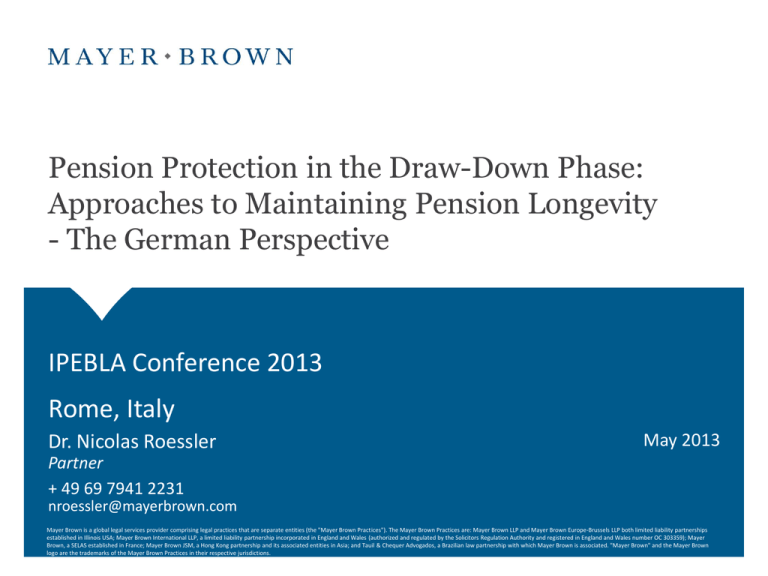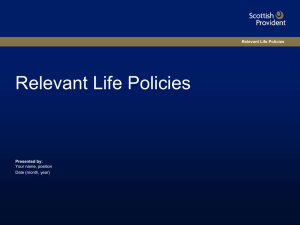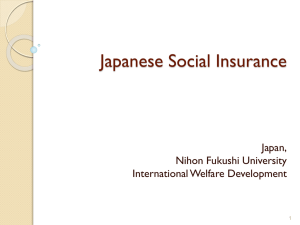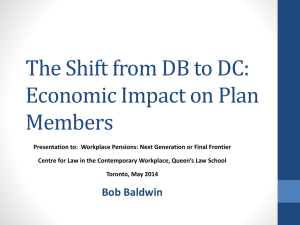Presentation - Mayer Brown
advertisement

Pension Protection in the Draw-Down Phase: Approaches to Maintaining Pension Longevity - The German Perspective IPEBLA Conference 2013 Rome, Italy Dr. Nicolas Roessler May 2013 Partner + 49 69 7941 2231 nroessler@mayerbrown.com Mayer Brown is a global legal services provider comprising legal practices that are separate entities (the "Mayer Brown Practices"). The Mayer Brown Practices are: Mayer Brown LLP and Mayer Brown Europe-Brussels LLP both limited liability partnerships established in Illinois USA; Mayer Brown International LLP, a limited liability partnership incorporated in England and Wales (authorized and regulated by the Solicitors Regulation Authority and registered in England and Wales number OC 303359); Mayer Brown, a SELAS established in France; Mayer Brown JSM, a Hong Kong partnership and its associated entities in Asia; and Tauil & Chequer Advogados, a Brazilian law partnership with which Mayer Brown is associated. "Mayer Brown" and the Mayer Brown logo are the trademarks of the Mayer Brown Practices in their respective jurisdictions. Agenda 1. Can participants receive benefits at times other than retirement? Are there any penalties for doing so? 2. What are permissible forms of payment from plans? Specifically, are annuity payments standard/common/permitted from DC plans? From DB plans? 3. Do plans have investment options (participant-directed or otherwise) that are structured to provide a change in investment as the participant nears retirement and/or retirement age? 4. Are participants permitted to transfer/”rollover” retirement savings? If so, are those opportunities limited to any specific type of plan/savings account/annuity? 5. What type of obligations do employers/plan sponsors have with respect to participants who are no longer active employees? What about participants with unclaimed benefits? 2 Can participants receive pension/benefits at times other than retirement? • Yes, under Sec. 6 of the German Pensions Act (BetrAVG) • Participants are entitled to benefits as of the day at which they draw an old-age pension in the German statutory pension scheme – Earliest possible age varies depending on type of old-age pension (e.g. age 60 for handicapped participants, age 62 for participants with 35 contribution years, born after 01 Jan 1952) • Creates parallelism between occupational old-age pensions benefits and statutory old-age pension benefits 3 Are there any penalties if participants receive benefits at times other than retirement? • No automatism – Depends on plan rules • Plan rules must be transparent and in line with the doctrine of just and equitable treatment • In the absence of specific language in the plan rules: gap must be filled by means of interpretation (works only for pre-1975 plans) • Practical Implementation – Regularly actuarial reductions of 0.5% of benefits per month of earlier drawing – In so-called „brick systems“, in which one „pension brick“ is earned per year, no further bricks are earned 4 What are permissible forms of payment from plans? • Generally every form of payment is permissible – annuity payments – lump sum payments – installments – benefits in kind (electricity, housing, gas, coal, etc.) • To qualify as a „pension“ in the meaning of the BetrAVG, the benefit must be granted with the purpose to ensure the beneficiary‘s (or his/her dependants‘) standard of living after retirement 5 What are permissible forms of payment from plans? • Are annuity payments standard/common/permitted from DC/DB plans? – Always minimum benefit guarantee in Germany (“pure” plans not statutorily recognized) – Payment form mainly depends on financing method (Durchführungsweg). Very generally speaking, the typical payment forms are: Financing Method Typical payment form direct commitment lump sum and annuity direct insurance lump sum Pensionskasse annuity German pension fund annuity support fund annuity 6 Do plans have investment options (participant-directed or otherwise) that are structured to provide a change in investment as the participant nears retirement and/or retirement age? • Many major plans have adapted liability driven investment or lifecycle investment set-ups in the last five years – lifecycle mainly for so-called contribution-oriented DB plans (employer pays defined contribution, but is liable for a certain benefit, which is calculated actuarially at the time at which the pension promise is made) – liability driven investment strategies mainly for more traditional DB plans • Rarely any participant-directed investment – employer bears risk of minimum benefit – insurance companies need to meet minimum interest requirements and generate profit – Some company or industry specific funding vehicles (Contractaul Trust Arrangements, German pension funds, etc.) have „investment comittees“, with seats for employee/union representatives – Some new plans offer „investment toys“ 7 Are participants permitted to transfer retirement savings? • Transfer from occupational plan to occupational plan: – Governed by Sec. 4 BetrAVG • transfer allowed based on voluntary agreement between old employer and new employer and employee: – transfer of liability and underlying pension promise from old employer to new employer, or – transfer of so-called transfer value (Übertragungswert) from old to new employer, provided that new employer gives pension promise of „equal value“ (wertgleich) • What is the „transfer value“? • Calculated differently, depending on financing method: • present value (Barwert) of vested entitlements in case of direct promise or support fund promise • value of accrued capital in case of direct insurance, German pension fund or Penisonskasse promise 8 Are participants permitted to transfer retirement savings? • Transfer from occupational plan to occupational plan: – Governed by Sec. 4 BetrAVG • transfer allowed based on voluntary agreement between old employer and new employer and employee: – employee requests transfer of transfer value from old employer to new employer within one year after end of employment relationship, and – pension is financed via German pension fund, direct insurance or Pensionskasse, and – transfer value does not exceed social security contribution ceiling (roughly 67 k EUR) => backed by corresponding „best practice transfer guidelines“ on German insurance industry 9 Are participants permitted to transfer retirement savings? • Transfer from occupational plan to private plan: – Generally possible and common standard that employees continue direct insurance commitments with private contributions after end of employment relationship 10 What type of obligations do employers/plan sponsors have with respect to participants who are no longer active employees? What about participants with unclaimed benefits? • Pro rata entitlements vest five years after pension has been promised if employment ends after age 25 • Employer is always (secondary) liable for vested entitlements, i.e. employer must pay in case external funding vehicle is unable • Participants have information rights as regards – level of benefits at retirement age, and – amount of the „transfer value“ (Übertragunsgwert), i.e. lump sum that the new employer would have to pay to the current employer in case employee changes employers • Adjustment of benefits – either 1% increase per year, or – test every three years whether benefits can be adjusted to development of costs of living in light of the employer‘s economic situation 11 Dr. Nicolas Rößler, LLM Dr. Nicolas Rößler, LLM Partner, Frankfurt Practice: Employment & Benefits nroessler@mayerbrown.com T: +49 69 79 41 2231 Nicolas Rößler is a partner in the Employment and Benefits practice in Mayer Brown’s Frankfurt office. He advises and represents national and international clients in all areas of individual and collective employment law and in connection with the set-up and restructuring of benefit schemes. His work especially focuses on matters concerning occupational pension schemes, especially the implementation of funding mechanism for such schemes such as German pension funds or Contractual Trust Arrangements (CTA). Nick also regularly advises his clients on restructurings and employment and pensions law issues in M&A transactions. Nick heads our German pensions product group, in which Mayer Brown combines forces from different practice groups, such as finance, tax, employment & benefits and insurance to provide interdisciplinary fullservice legal advice on all matters related to occupational pensions, including plan mergers and asset management and selection advice. Nicolas is a regular speaker on employment and pensions law topics at seminars and conferences. He has lectured at King’s College School of Law in London on European Employment Law. 12 About Mayer Brown - Office locations • 800 lawyers in the Americas, 400 in Europe and 300 in Asia 13 How to contact us: Frankfurt Friedrich-Ebert-Anlage 35-37 60327 Frankfurt am Main Tel.: +49 69 79 41 0 Fax: +49 69 79 41 100 Düsseldorf Graf-Adolf-Platz 15 40213 Düsseldorf Tel.: +49 211 86224 0 Fax: +49 211 86224 100 14







